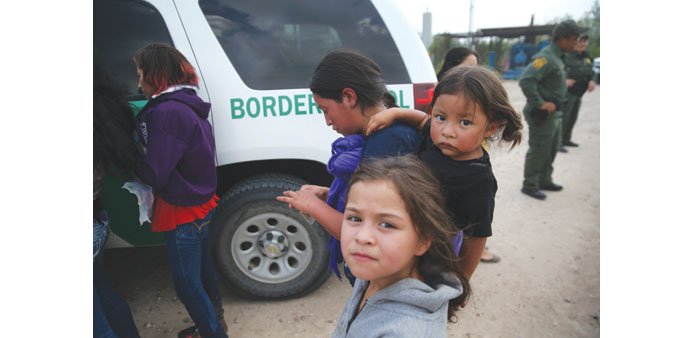Reuters
Republicans in the US Congress struggled yesterday to bridge internal differences over how to deal with a flood of child migrants at the southwestern border, mulling proposals likely to be rejected by President Barack Obama and congressional Democrats.
The confrontation between the Republican-controlled House of Representatives and the Democratic-controlled Senate increased the risk that no compromise will be reached ahead of lawmakers’ summer break, which is set to begin at the end of next week.
That could mean that agencies in charge of securing the border with Mexico and caring for migrant children end up scrambling to find savings in other operations until Congress and the White House can agree on emergency funding in September.
House Republicans huddled behind closed doors yesterday morning to try to come up with a plan for voting on a bill next week, before the start of the five-week break.
But they left undecided over how to respond to Obama’s request for $3.7bn in emergency funds.
The administration says the money is needed to deal with tens of thousands of children from El Salvador, Guatemala and Honduras amassing at the Texas border with Mexico and hoping to gain admittance into the United States.
Some Republicans warned that inaction on the headline-grabbing issue could spark a voter backlash in the run up to November’s congressional elections.
“We have a big political risk if we leave (in August) without doing anything,” Representative Bill Flores of Texas told reporters upon leaving the meeting.
“People are nervous. Some are nervous that we won’t do anything. Some are nervous that we will do too much,” said Flores, referring to his fellow House Republicans.
Flores wants the House to stay in session until the border funding problem is resolved.
With Senate Democrats preparing to vote next week on a bill to give Obama $2.7bn of his $3.7bn request, House Republicans are considering a much smaller amount, possibly $1bn or less, according to several lawmakers.
Representative Charlie Dent of Pennsylvania said any bill that arrives on the House floor next week would spend less than $1.5bn.
He added that it could be “significantly” less, but he would not speculate on a precise number.
Furthermore, Republicans, including House Rules Committee Chairman Pete Sessions, sketched out controversial policy changes they would like to couple with any new money, which are certain to be rejected by Obama and Democrats in Congress.
These could include repealing a programme Obama instituted on his own in 2012, which temporarily stopped deportation proceedings against some youths brought illegally into the United States by their parents before mid-2007.
Republicans argue that the policy is encouraging Central American children to flock to the United States.
Another, possibly more likely, policy change would amend a 2008 US anti-trafficking law so that it would allow the administration to more quickly and easily deport the Central American children.
Both ideas, said one senior Senate Democratic aide, would be “a non-starter” in the Democratic-controlled Senate.
House Democratic leader Nancy Pelosi said of the proposed changes to the 2008 law: “Are we going to live up to our responsibility for humanitarian assistance, due process and the rest or are we going to take a cheap shot at kids?”
California attorney-general asks major law firms to help immigrant children
California’s attorney-general has personally asked several major law firms to provide pro bono services to unaccompanied immigrant children flooding the US border with Mexico, a signal that California views the growing crisis as a humanitarian issue.
The move comes amid escalating political tension in the United States over how to deal with the thousands of children fleeing violence in their Central American homelands.
“We’ve convened a group of law firms to make sure these children, some of them as young as 8 years old, have access to due process,” California Attorney-General Kamala Harris said on Thursday.
Central American children began flooding the border at crossing points in Texas earlier this year, overwhelming local officials and leading the federal government to send thousands to other states for processing.
By the end of June, about 3,000 of the children had been sent to California.
In meetings in Los Angeles last week, Harris asked lawyers for some of the state’s most prestigious firms to donate 500 hours of pro bono work to the children this year, spokesman Nicholas Pacilio said.
She asked corporate lawyers for entertainment giants including the Walt Disney Company and Warner Bros Entertainment to do the same, he said, adding that most had agreed to help.
Harris’ remarks came a day after California Governor Jerry Brown said that California would “do its part” in the crisis, despite calls by anti-illegal immigration activists to speed up deportation proceedings.
Brown said California viewed the flood of children as a humanitarian crisis, rather than a political issue.
The influx of children at the border, mostly fleeing violence and poverty in El Salvador, Guatemala and Honduras, has intensified the debate over immigration reform and overwhelmed US authorities, who have been hard-pressed to find housing for the young migrants as they await deportation proceedings.
On Tuesday, planning commissioners in the San Diego suburb of Escondido rejected a proposal to open a temporary shelter for some of the children.
Harris said there was much the state could do to help the children sent here, but that ultimately, immigration issues should be dealt with at the federal level.
She criticised Congress for failing to act on a stalled package of immigration reforms that would have included a path to citizenship for millions of undocumented immigrants in the United States. “They’ve fallen short.”

